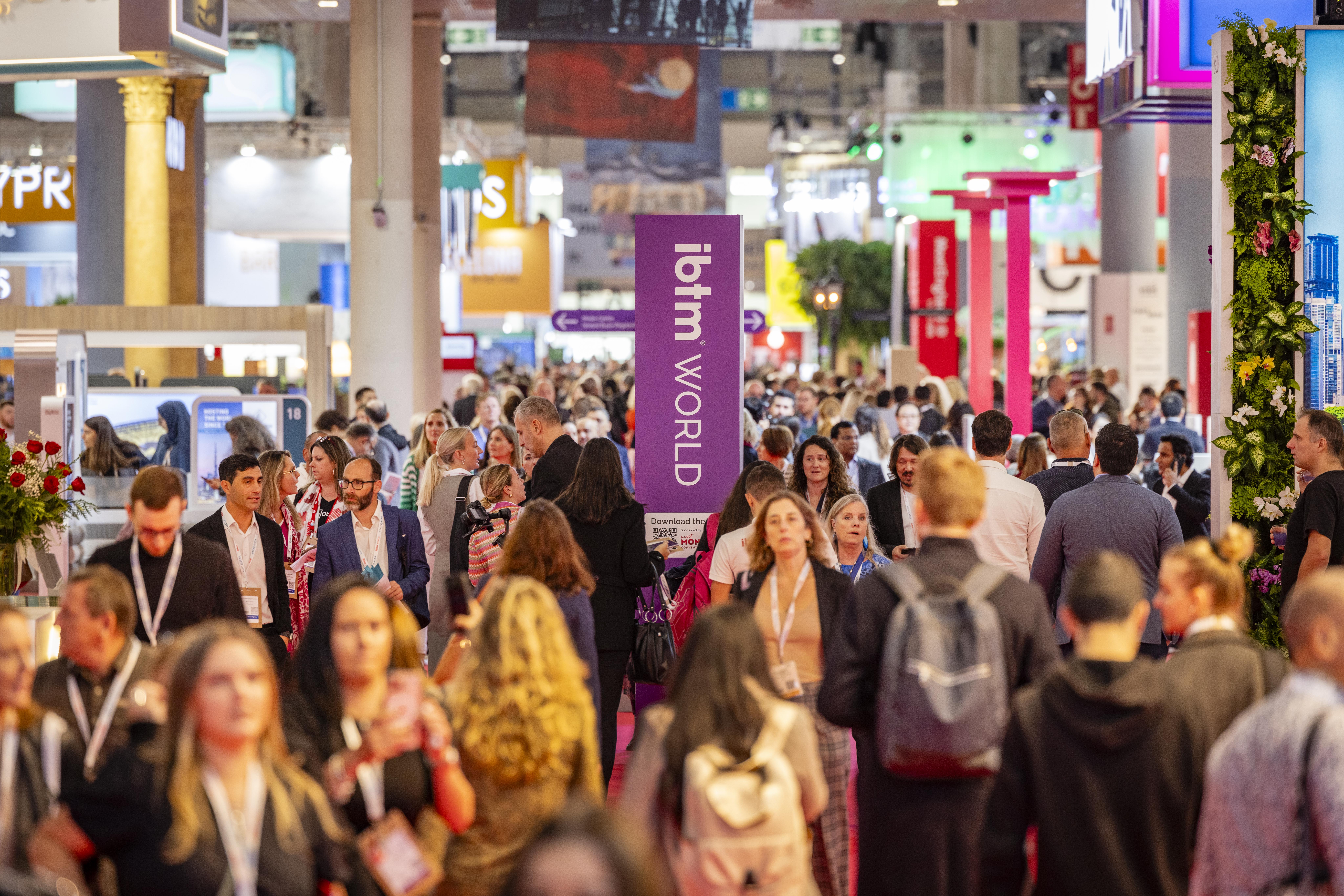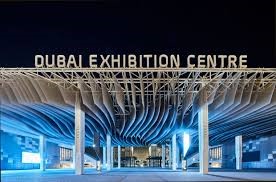The Power of Business Events to Connect
Imagine stepping into a conference hall buzzing with entrepreneurs, industry leaders, and policymakers from around the world. Conversations spark, ideas flow, and collaborations take root – this is the power of business events.
Beyond driving decisions, their impact ripples across tourism, trade, and global relations, fostering cultural exchange and economic growth. Events like the World Economic Forum, for example, bring together government, businesses and civil society to improve the state of the world, while mega events like China’s Canton Fair – one of the world’s oldest and largest trade fairs, boost global commerce.
With business event attendees often extending their stay or returning as leisure travellers, they are a tourism drivers too. Dubai Expo 2020, for example, welcomed 24.1 million visitors over six months, with 30% coming from abroad, demonstrating how such gatherings leave a lasting imprint on destinations.
Events like expos also play a crucial role in international cooperation and cultural exchange, the Bureau International des Expositions (BIE) highlights, elevating the host nation’s global profile and inspiring fresh ideas through the showcase of diverse cultures and innovations. Ultimately, they act as catalysts for meaningful dialogue and long-term development.
With the global events market projected to exceed $2.5 trillion by 2035, growing at an annual rate of 6.8% (Allied Market Research), their influence on tourism, trade, and international collaboration is set to expand significantly.
ATM Unlocks Business Events Potential
Recognising this momentum, Arabian Travel Market (ATM)—the Middle East’s leading travel industry event—is launching IBTM@ATM, a dedicated zone designed to harness the potential of business events.
Debuting at the 2025 show (April 28 to May 1), this new feature also responds to demand from ATM visitors, with more than 7,000 attendees, 1,500 buyers and 400 exhibitors expressing interest at the 2024 edition.
Aligned with ATM 2025’s theme, ‘Global Travel: Developing Tomorrow’s Tourism Through Enhanced Connectivity’, IBTM@ATM will foster strategic connections, collaboration, and data-driven insights.
The platform will connect suppliers and buyers through scheduled appointments and business exchange sessions, while the new Business Events Stage will feature discussions on business travel, innovation, and socioeconomic growth—reinforcing ATM’s role as a global networking hub. Discussions will include:
- How Global Events and Festivals Drive Socio-Economic Growth, in partnership with the International Congress and Convention Association (ICCA)
- The State of the Nation: Navigating the Future of Business Travel in the Middle East, in partnership with the Global Business Travel Association (GBTA)
- Demystifying Technology in Events – The Human Connection vs AI, in partnership with brand experience agency Multilem
The launch of IBTM@ATM builds on ATM’s announcement of ICCA—the global meetings industry network—as its official Business Events Partner. At ATM, ICCA will lead discussions on the evolving business events landscape, facilitate attendance for key international association buyers, and unveil an exclusive government meeting ranking report, highlighting the growing influence of the Meetings, Events, Conferences & Exhibitions (MICE) sector on global economic development.
The Rise of Global Event Hubs
With a projected value of $1.8 trillion by 2030, destinations worldwide are vying for a share of the lucrative MICE market. investing in cutting-edge venues and seamless travel infrastructure to attract high-value business and conference travellers, some of the leading global event hubs include:
Dubai: The Middle East’s MICE Powerhouse
The city strengthened its position as a leading destination for major international conferences, corporate meetings, and incentives in 2024, securing a record 437 events across various industries, up 20% year on year.
These conferences and exhibitions will bring 210,731 delegates to the city in the coming years, reinforcing the city’s status as a global events hub. Dubai was also ranked by ICCA as the top city in the Middle East for the number of association meetings hosted, while Cvent named the city first on its ‘Top Meeting Destinations in the Middle East and Africa’ hitlist.
Plans to double the number of MICE events staged and triple sector revenue to AED 54 billion ($14.7 billion) by 2033 through the expansion of the Dubai Exhibition Centre at Expo City Dubai, further cement Dubai’s MICE ambitions.
Saudi Arabia: A Fast-Rising Contender
Saudi Arabia is also rapidly growing its business events sector as part of its economic diversification strategy, Vision 2030, investing in world-class venues and positioning Riyadh as a key hub for global events (with ICCA ranking the city 5th in terms of the number of association meetings hosted).
Recent successes include the tec conference LEAP, which attracted more 170,000 visitors in February 2025. With demand soaring, the venue for future editions will be 350% larger than the current location.
In 2023, the kingdom hosted nearly 17,000 MICE events, up 15% on 2022, drawing more than 20 million attendees. This year (2025), the kingdom is set to launch 12 major international events across key sectors, including fintech, healthcare, and manufacturing.
Asia-Pacific: The Fastest-Growing Market
Asia Pacific is not only the largest MICE market in the world—generating 22.9% of global revenue in 2023—it is the fastest growing one too. With an anticipated CAGR of 9.9% from 2024 to 2030, it is expected to be worth $355.73 million by that date.
Country wise, India’s MICE sector is expected to register the highest growth rate over the next few years, but China remains the largest market in terms of value, generating more than $74.54 revenue in 2023, rising to $139.68 million in 2030. When it comes to splashing out on MICE infrastructure, China, Singapore, and Thailand are among the biggest spenders.
Europe & North America: Established Giants
London, Paris, and Berlin continue to dominate Europe’s MICE scene, with London alone offering more 1,000 event venues. Meanwhile, Portugal and Eastern European destinations are gaining traction as competitive alternatives, with MICE groups exploring untapped destinations to avoid overtourism align with sustainability goals. In ICCA’s worldwide rankings for association meetings, seven of the top 10 global destinations are in Europe, with Paris the top city.
In the US, Las Vegas remains the trade show capital, boasting 3.2 million square feet of convention space. Orlando’s Orange County Convention Centre welcomes around 1.5 million attendees annually, making it one of the busiest in the world. In terms of number of association meetings hosted, ICCA ranks the US first globally on its countries list.
How Business Events Boost Economies
All of these MICE events do more than fill conference rooms and exhibition halls – they create massive economic benefits.
According to the Events Industry Council (EIC), the global business events industry generates around $1.6 trillion in GDP, which is comparable to the 13th largest economy worldwide.
With a total output of $2.8 trillion when considering indirect and induced impacts, the substantial contribution of events to the global economy are clear. In simple terms, $1 spent on business events generates $8 in economic impact. Here’s a more detailed run down.
- Job Creation & Economic Growth
Business events support millions of jobs worldwide, from event planners and hoteliers to tech providers and local vendors, and give the entire economy a boost, before, during and after the event. Expo 2020 Dubai is a great example, with an EY study revealing the event is expected to contribute AED 154.9 billion (US$42.2 billion) of gross value added (GVA) to the UAE economy from 2013 to 2042, plus 1.039 million full-time jobs.
The sectors contributing most to Expo’s GVA – a key measure of economic productivity – are events organisation and business services ($20.6 billion), construction ($8.7 billion), and restaurants and hotels ($6.3 billion). The pre-event phase contributed around one quarter of GVA, the event itself added almost 13%, while the lion’s share of economic benefits – 62% – will be felt in the legacy phase through to 2042, says EY.
- Driving Investment & Trade
International business events serve as a gateway for investment and trade opportunities. Expos, summits, and trade shows connect investors with startups, corporate leaders with policymakers, and buyers with sellers.
In November 2024, the 136th edition of Canton Fair in China—one of the world’s largest trade shows—signed deals worth more than $24.95 billion and attracted a record 253,000 international visitors, while the 2024 Farnborough International Airshow (FIA) led to aircraft deals surpassing £81.5 billion ($103 billion), reinforcing how events drive industry defining trade agreements.
Meanwhile, a record £63 billion of private investment was committed at the 2024 Global Investment Summit staged in London, almost double that secured at the 2023 edition, creating close to 38,000 jobs, demonstrating the direct benefits of such events.
- Knowledge Exchange & Innovation
Beyond the figures, business events are catalysts for knowledge-sharing across industries and nations.
The World Economic Forum (WEF) in Davos, for example, brings together global leaders from business, government, civil society, media, and academia to find solutions to pressing challenges, with the 2025 theme, Collaboration in the Intelligent Age, addressing issues like climate change, economic growth and the future of work.
Conferences also spark innovation for global good. At CES (Consumer Electronics Show) 2024 more than 4,000 exhibitors unveiled AI, smart city, and clean energy technologies, leading to billions in investment, while Web Summit Lisbon has emerged as a leading global platform for tech startups, with investors committing more than $3.5 billion in funding deals annually.
In medicine, The American Society of Clinical Oncology (ASCO) Annual Meeting has been instrumental in the development of pioneering cancer treatments, with studies presented there often influencing medical policies worldwide. Similarly, the Web Summit in Lisbon has emerged as one of the leading global platforms for tech startups, with investors committing more than $3.5 billion in funding deals annually. Across industries, face-to-face interactions at event remain invaluable—79.8% of organisers strongly agree that in-person conferences, summits, and conventions are a critical component of their organisation’s success (Bizzabo) and 50% of attendees say in-person B2B conferences provide the best networking opportunities.
The Blended Travel Opportunity

Beyond learning, forging deals and changing the world, business events also provide opportunities to see new places, fuelling the rise of ‘bleisure’ (business + leisure) travel. Also known as blended travel, AMEX reveals 87% of business travellers want to explore new destinations during business trips and 75% want to add on a family break.
Business travellers also outspend leisure tourists, often using personal funds to enhance their stay, with Booking.com revealing corporate travellers spend an average of $700 beyond their budget per trip. Crucially, successful business trips frequently lead to return visits with family and friends, creating long-term tourism potential.
The upshot for destinations is that hosting conferences and exhibitions is more than a one-time event—it’s an opportunity to convert business visitors into repeat tourists. With linked business trips—where travellers combine multiple meetings, events, and stops—also on the rise (GBTA), destinations with strong infrastructure stand to gain the most.
Future Trends Shaping Business Events
Delegate expectations are also evolving, with emerging trends governed by smart technology, sustainability and personalisation:
Smart Destinations Improve Connections
Technology is making business events more seamless and engaging. AI, big data, and real-time analytics are improving networking, security, and efficiency. Facial recognition speeds up check-ins, AI-driven matchmaking connects attendees, and hybrid formats bridge in-person and virtual experiences.
Dubai, a leader in smart city innovation, integrates RFID/NFC tracking, mobile apps, live streaming, cashless payments, AI-powered networking, and advanced analytics into its event infrastructure, setting a global benchmark.
Sustainable Events: It’s Non-Negotiable
Carbon-neutral events, waste reduction, and eco-friendly venues are now industry priorities, particularly as some companies have carbon footprint limits that hold employees accountable when booking events and travelling for business.
Destinations that are quick to adapt will win more business. Trailblazers include Copenhagen, which offers green transport, sustainable catering, and carbon-neutral conferences, while Saudi Arabia’s NEOM project is pioneering sustainable event infrastructure powered by renewable energy and smart city solutions. In Australia, ICC Sydney has implemented energy-efficient lighting, water conservation, and waste diversion, positioning itself at the forefront of sustainable events.
Personalised Events: A Tailored Experience

Another consideration for MICE providers is the delegate experience, with immersive, wellbeing-focused, and culturally connected events now in favour.
Event organisers are responding by integrating bespoke experiences, from tailored networking sessions to curated cultural and adventure activities. Dubai Business Events, for example, offers personalised itineraries, ensuring attendees can engage with the city’s unique offerings beyond the conference.
Technology plays a central role too. AI-driven apps, personalised agendas, and real-time translation services are enhancing engagement. EventMB reports 78% of event planners believe personalisation leads to higher satisfaction, proving that high-impact, tailored experiences are the future.
This now extends to wellness, now a pivotal aspect of MICE events according to Hilton, which offers delegates mindfulness sessions, meditation, massages, outdoor walk-and-talks, holistic packages, and more. Taking it further, some event attendees are seeking specific programmes that prioritise high-performance living featuring advanced diagnostics, recovery therapies, and extreme self-care to optimise mental and physical wellbeing.
Connecting People and Places to Opportunities

As business events evolve to meet new expectations, they remain powerful platforms for economic growth, knowledge exchange, and meaningful connections. In an era where face-to-face interactions are more valued than ever, these gatherings drive investment, foster innovation, and shape the future of industries.
With destinations investing in smart event infrastructure, technology enhanced experiences, sustainability focused solutions, and delegate wellbeing initiatives, the future of business events looks more dynamic than ever. As companies and governments continue to harness their potential, these events will play an even greater role in connecting people, ideas, and opportunities—shaping the industries and economies of tomorrow.
Top Five Takeaways
- Business Events Drive Economic Growth and Tourism
Global events significantly contribute to economic expansion by creating jobs, attracting investment, generating trade opportunities, and boosting tourism. - Destinations Are Competing to Become Global Event Hubs
Cities like Dubai, Riyadh, and key destinations across Asia-Pacific, Europe, and North America are investing heavily in infrastructure to attract more MICE business. - Blended Travel Is on the Rise
The merging of business and leisure travel, or ‘bleisure,’ is becoming a MICE-defining trend. Delegates seek to extend their stays beyond their event and return to destinations with family and friends at a later date, presenting tourism-boosting opportunities. - Technology and Sustainability Are Transforming Events
Smart technology, AI-driven matchmaking, facial recognition for seamless check-ins, and hybrid event formats are enhancing engagement. Sustainability has become a priority, with destinations who focus on carbon-neutral venues, waste reduction, and eco-friendly initiatives set to win more business. - Strategic Business Events Create Lasting Impact
Business events serve as catalysts for knowledge exchange, innovation, and global change. Events can drive policy discussions and industry advancements, reinforcing their role in shaping global industries and fostering long-term collaborations.




